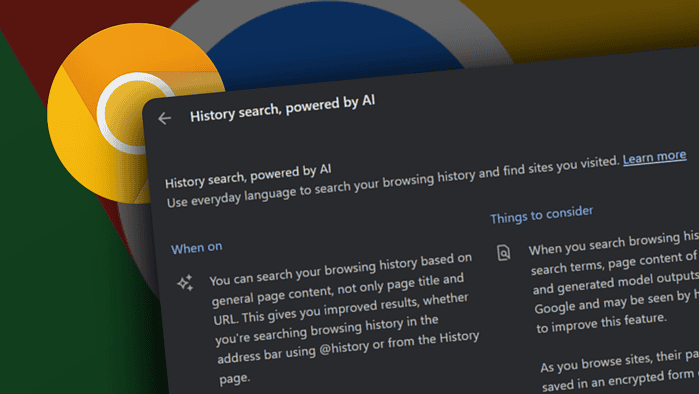Google Chrome's AI on browsing history may still use human reviewers for training purposes
Google, however, says that page contents are still "saved in an encrypted form" locally.
Key notes
- Google Chrome’s history search will soon allow content-based searches using AI.
- This “History search, powered by AI” uses everyday language to find sites.
- Search data is sent to Google, but page contents are encrypted locally.

The weeks-old rumor is true. Yes, Google Chrome’s browsing history will soon get an important feature that could change how we browse the web: you can search for anything there, not just for the website’s pages but also its content, thanks to AI.
The rumor first arrived earlier this month when this eagle-eyed folk on X (formerly Twitter) spotted a neat little change when you access your browsing history on Chrome.
And now, what’s new is that Google has updated this feature’s description. It is now called “History search, powered by AI” and it lets you “use everyday language to search your browsing history and find sites you visited.” Here’s what it looks like, courtesy of trusted Chrome enthusiast @Leopeva64.

But one thing to consider, as Google puts it, human reviewers may still be used “to improve the feature.” Search terms and page content of best matches are still being sent to Google for model training, but if you’re worried about your privacy, Google says that page contents are still “saved in an encrypted form” locally.
Meaning, that there are no ways for Google employees to have access to those websites you’ve visited, only the search queries and all that.
Instead of a simple grouping of dates or keyword groups, which is what we currently have on Chrome’s Stable channel, you can search for phrases within the page itself. That means, everything inside these web pages is searchable by you.
Google Chrome has added even more AI features in the past few months. Besides this, the popular browser also “borrowed” the Circle to Search feature from Android mobiles, and it may soon arrive for Chrome’s desktop version via Google Lens.
Read our disclosure page to find out how can you help MSPoweruser sustain the editorial team Read more




User forum
0 messages